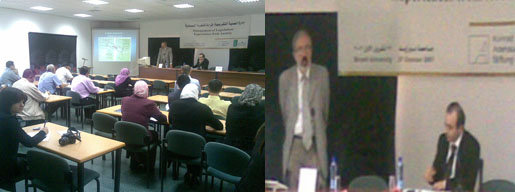Management of Legislation: Experiences from Austria
Dr. Günther Schefbeck, President of the Section of Archives and Archivists of Parliaments and Political Parties in the International Council on Archives, paid due tribute to the Palestinian Legal and Judicial System (AL MUQTAFI), which IoL inaugurated in 1994. Schefbeck asserted that IoL is carrying out a pioneering endeavour in this domain.
At first, Schefbeck presented a document on the Austrian Constitution published in 1920 and compared it to a 2003 version of the Constitution. Accordingly, the audience realised the important role of information technology (IT) in the delivery of legal information.
Schefbeck’s lecture addressed major points: Defining the essence of the legislative process; IT influence on the management of legislation; a detailed presentation of the Austrian experience, in terms of IT developments and breakthroughs in the process of legislation; and reference to a model system of legal information management.
Firstly, Schefbeck explained that legislation is a complicated, formal and multi-layer process, which encompasses a set of legal procedures that date back to the 19th century. Along with legal stakeholders, political players take part in the formulation of the legislative process. Moreover, the real value of the legislative process is as different as the types of legislation enacted. In the private law, for example, the legal value of the legislative process stems from the content of such a law. With respect to the concept of the rule of law, the legal value of the legislation is based on the quality of justice.
In this context, Schefbeck emphasised that dissemination of laws is crucial to the promotion of the rule of law and transparency in the legislative process.
Secondly, Schefbeck highlighted IT influence on legislative processes. Beginning in the 1970s, all pieces of legislation have been documented and the legislative process as a whole automated. The speaker also explained that automating legislation is a governmental task. As such, governments should select a work mechanism, including coordination with legal and IT specialists, as well as scrutinise the flow of work in this regard. Therefore, governments must enhance the quality of relevant procedures and outputs as well as promote public participation.
Thirdly, Schefbeck presented the Austrian experience in the management of legislation. From a functional perspective, a system was created to allow collection of information. With this system, users can interact and communicate with one another. Another system was also developed for electronic flow of information. From an organisational standpoint, a special system was created for each of the two chambers of the Austrian parliament: the National Council (Nationalrat) and the Federal Council (Bundesrat). Later, an integrated system was set for both councils. Schefbeck also made reference to the Austrian Electronic Law, which remarkably reduced printing costs associated with the publication of the Austrian Official Gazette. On 6 June 2001, the Republic of Austria made the first step towards development of an electronic system that supports the legislative process. On 1 January 2002, legal information was disseminated electronically. Finally, all effective Austrian laws were published on the Internet on 1 January 2004. Pieces of legislation which are yet to be approved can also be accessed. Furthermore, Austrian stakeholders employed the Extensible Markup Language (XML) program, which helps save and retrieve legal texts.
Additionally, Schefbeck elaborated on stages of legislation making in Austria as well as IT role in this process, both before an item of legislation is forwarded to the Parliament for approval or after that item is approved.
IT has effectively expedited the enactment of legislation in Austria as well as provided a direct public access to enacted laws. In addition to saving 60 tons of paper, approximately 1 million Euros a year, Austrian users can now access consolidated legal texts.
Finally, Schefbeck presented another model for the management of the legislative process in the Parliament of Serbia, which greatly relies on the Austrian experience.











